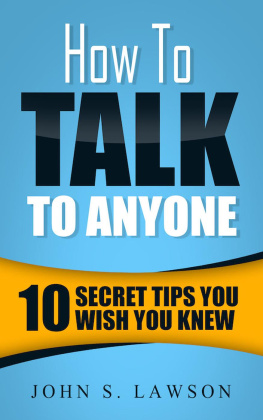John S. Lawson - How To Talk To Anyone: 10 Secret Tips You Wish You Knew
Here you can read online John S. Lawson - How To Talk To Anyone: 10 Secret Tips You Wish You Knew full text of the book (entire story) in english for free. Download pdf and epub, get meaning, cover and reviews about this ebook. year: 2020, publisher: JW Choices Pte Ltd, genre: Business. Description of the work, (preface) as well as reviews are available. Best literature library LitArk.com created for fans of good reading and offers a wide selection of genres:
Romance novel
Science fiction
Adventure
Detective
Science
History
Home and family
Prose
Art
Politics
Computer
Non-fiction
Religion
Business
Children
Humor
Choose a favorite category and find really read worthwhile books. Enjoy immersion in the world of imagination, feel the emotions of the characters or learn something new for yourself, make an fascinating discovery.
- Book:How To Talk To Anyone: 10 Secret Tips You Wish You Knew
- Author:
- Publisher:JW Choices Pte Ltd
- Genre:
- Year:2020
- Rating:5 / 5
- Favourites:Add to favourites
- Your mark:
- 100
- 1
- 2
- 3
- 4
- 5
How To Talk To Anyone: 10 Secret Tips You Wish You Knew: summary, description and annotation
We offer to read an annotation, description, summary or preface (depends on what the author of the book "How To Talk To Anyone: 10 Secret Tips You Wish You Knew" wrote himself). If you haven't found the necessary information about the book — write in the comments, we will try to find it.
John S. Lawson: author's other books
Who wrote How To Talk To Anyone: 10 Secret Tips You Wish You Knew? Find out the surname, the name of the author of the book and a list of all author's works by series.
How To Talk To Anyone: 10 Secret Tips You Wish You Knew — read online for free the complete book (whole text) full work
Below is the text of the book, divided by pages. System saving the place of the last page read, allows you to conveniently read the book "How To Talk To Anyone: 10 Secret Tips You Wish You Knew" online for free, without having to search again every time where you left off. Put a bookmark, and you can go to the page where you finished reading at any time.
Font size:
Interval:
Bookmark:
How to Talk to Anyone
10 Secret Tips You Wish You Knew
Jonathan S. Lawson
Copyright 2016
All rights reserved.
Also by John S. Lawson
How To Talk To Anyone: 10 Secret Tips You Wish You KnewJ
From Painfully Awkward To Socially Successful: How You Can Talk To Anyone Effortlessly, Communicate On A Personal Level, & Build Successful Relationships
Transform Your Habit, Transform Your Life: Be the Person You Were Always Meant To Be
De dolorosamente incmodo a socialmente exitoso: Cmo puede hablar con cualquiera sin esfuerzo y construir relaciones exitosas
Transforma tu hbito, transforma tu vida: 50 consejos que cambian la vida a la riqueza, la salud, el xito y la felicidad inimaginables
SEO: Las mejores estrategias de SEO para dominar el mercado
CONTENTS

Introduction | |
Chapter 1: Before We Begin | |
Chapter 2: Secret Tips 1-2 | |
Chapter 3: Secret Tips 3-4 | |
Chapter 4: Secret Tips 5-6 | |
Chapter 5: Secret Tips 7-10 | |
Chapter 6: Bonus | |
Conclusion |
 |  |


I want to thank you for purchasing this book. Since you bought it, you probably have problems talking to people, and that is okay. First off, know that you are not alone. This problem affects millions across the globe every day. Secondly, congratulations on making the decision to making a change. It takes a strong person to recognize that there is a problem, and an even stronger person to do something about it.
In this book, you will find information on possible causes of this problem, and information comparing today's age to the older days, to see if there has been a change in the overall communication over the years, to figure out if that alone could be a problem. You will find ten secrets to help you be a better communicator, and help you get over any problems with communication you may have.
By the end of this book, you should be able to talk to even the most distant of strangers. You will have some things to practice, that will make you a better conversationalist, and you will even be able to initiate a conversation without any awkwardness. Enjoy!
 |  |


B efore we jump right into the secret steps, there is some basic information that you should know. This will help you to better understand the basis of your communication block. In truth this world is a lot different than it used to be back in the days of covered wagons and community bathing, but maybe, it isn't better in some ways. Yes, now we have technology and indoor plumbing, but there is a haze over us that maybe is not as friendly as it used to be.
People call this the age of communication, based on the ease in which we can talk to people miles away from us. That is a great thing in all, but how about the people that are right next to us? Over seventy percent of the world's population admits to having a problem with communicating properly with people in their own families, and they definitely can't hold a proper conversation with strangers or basic acquaintances. This is a problem, but is it really so different than the days of yore? Let us compare, shall we?
In the old days (before telephones were in every household, even before the invention of the telephone) it was so much easier to talk to people face to face. That is because for the longest time, it was the only form of communication, other than the post that came every week, or the occasional messenger pigeon that often took days to reach a destination seventy miles away. If you wanted to have a full on conversation in real time with someone, you had to go to their house, and talk to them. This meant that communication was futile to survival, because if you needed something you had to ask for it. You would have to communicate regularly with everyone around you. Walking down the street, it was customary to greet everyone with a smile, and a hello, how are you today? To not do so was considered bad manners.
Humans had to interact by speaking several times a day, and as a result, everyone was more friendly to each other, because you never know when you might need their help. People regularly dropped by their friends' houses unannounced and unplanned, because they had no way to call ahead to see if they were available. These visitors were not turned away, they were greeted with open arms. Children came in to greet the guests, before being sent back outside to play, unless the visitor wished to speak with them as well. Often, these visitors were asked to join the family for a meal before heading back out into their travels. During these meals, stories were swapped, and laughter filled the air. As the visitor left, they were followed by a chorus to come again any time, and they echoed by extending their own invitation to those they visited.
Children were taught from a young age how to socialize. They were sent outside to make their own friends, and taught how to be self sufficient. This gave them the confidence to speak to others. In school, they were instructed on what was appropriate conversation, and what was not. Children were often taught not to speak unless spoken to. This was to teach them not to interrupt those that were talking, and to truly listen to those around them. They were not taught to listen to make a reply, but were taught to listen so they could learn. This made them become friendly, and compassionate adults that were able to hold efficient conversation in the highest of social settings. Even home schooled children were taught how to behave when company was over, and were taught social cues by their parents. This was important, because even the most basic of farmers were visited often by the mayor of the town, or the pastor, and if the family, or even the children did not know how to socialize, it was an embarrassment. Of course, people were understanding, but conversation was key to survival, and if you were not good at communicating, it could sometimes be hard for someone to understand you, and children were taught this so they would take their social lessons seriously.
Strangers were welcomed with open arms as well. There was not a stigma that strangers were a bad thing, as you couldn't make friends if you weren't nice to strangers. Talking to even the oddest of strangers was a breeze. If a new person rode into town, they were welcomed into the home by the mayor or local pastor depending on the jurisdiction of the town. Sometimes even the sheriff invited the stranger over to his house. They person was treated like family, and served a fine feast to replenish their energy from their long journey, and that dinner was spent conversing about life, and getting to know this stranger. By the end of the evening, generally the house was filled with laughter as stories were swapped like they had been friends since birth. Strangers were not made to feel uncomfortable, or like an outsider. If the stranger had a trade, they were sent on to the local person who was an expert on the trade for an internship or to help and expand the knowledge about the subject. If there was no one who was an expert in that trade, this person was set up with help to start it up if they planned to stay in town long. Drifters were even more highly revered, as they had so many stories of different places they had been, and often he would spend his time in the town at various houses as he told his tales over and over again, entertaining the locals, and getting room and board and food for doing nothing more than telling stories of the places he had been.
Next pageFont size:
Interval:
Bookmark:
Similar books «How To Talk To Anyone: 10 Secret Tips You Wish You Knew»
Look at similar books to How To Talk To Anyone: 10 Secret Tips You Wish You Knew. We have selected literature similar in name and meaning in the hope of providing readers with more options to find new, interesting, not yet read works.
Discussion, reviews of the book How To Talk To Anyone: 10 Secret Tips You Wish You Knew and just readers' own opinions. Leave your comments, write what you think about the work, its meaning or the main characters. Specify what exactly you liked and what you didn't like, and why you think so.










